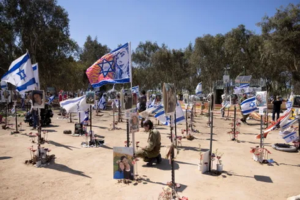‘Rape has one sound’ | Survivor of October 7 Hamas massacre testifies to sexual violence

Tali Biner who survived the Nova festival massacre on October 7, speaking at a conference in Israel on sexual violence during war on 26 November 2024
Liza Rozovsky reports in Haaretz on 27 November 2024:
Warning: The article contains graphic descriptions of sexual violence.
Tali Biner, who survived the Nova festival massacre, described on Tuesday at a conference on sexual violence during war how she bore witness to sexual crimes on October 7. “I heard a couple, a boy who was yelling and pleading for them to leave the girl alone, leave her alone,” she recalled.
“People are always asking me how I know that women were really raped there, questions that push me into some corner. Rape has one sound. It sounds the same. It always sounds like helplessness that descends into a loss of humanity,” she said.
Biner, a surgical nurse by profession, hid in a house trailer in the middle of the party for seven hours. “My friends and I understood at a certain point that there was nowhere left to run because they were bringing in wounded people from the road in the direction of the party,” she recalled before the conference, which was hosted by the Association of Rape Crisis Centers in Israel.
“We entered the trailer, clearly knowing we had nowhere to move, she recounted. “For these seven hours, my fears kept growing – from fear of missiles to fear of getting killed, and the most significant understanding was that I was going to remain silent for all these hours – even if I’d be wounded, even if they’d shoot me.”
She descried how she started to hear voices. “A few minutes felt like hours,” she said. “Women screaming. Screams that pierced the heavens and cut the soul into pieces. They made clear to me that if they always taught us that men fight each other in war situations, I quickly realized that me being a woman was a great disadvantage.” She added: “I was afraid to die. I was afraid to be raped. I was afraid that I’d have to provide proof and explanations about the fact that my soul was no longer here.”
She said that when she left the trailer, everything she had heard, like the pleading couple, received visual representation, like “seeing women with their legs spread apart, underwear cast aside and a torn shirt on their body.” She also described sexual crimes against men.
Biner spoke of her delicate emotional and mental state since the massacre. “Dreams are supposed to flood fears, and I can say that I dream several times a week, and I’m in a situation in which I’m raped or nearly raped or harassed for the sin of my femininity or my sexuality,” she said. “I can say that since October 7, I’ve removed from my lexicon the entire topic of sexuality. Something in my feminine and sexual light was extinguished. For me, sexuality became a form of exploitation. It’s the direct translation that was created for me,” Biner said. “I am afraid to be in a situation in which I say ‘no’ and no one listens to me.”

The site of the Nova rave
“Women should get much stronger backing and much less invasive treatment regarding what they suffered, she continued. “I want the person who did this to be punished and punished severely. There should be a hierarchy of punishment. Whoever took part in sexual violence that day should be punished much more severely.” Thus far, no terrorists who participated in the October 7 attack have been indicted. At the end of her speech, Biner called on women who suffered sexual crimes or witnessed them to make their voices heard. “We must raise our voices, each one in her time and according to her ability,” she said.
Aviva Siegel was abducted with her husband Keith from Kfar Azza, a kibbutz near the border with Gaza. Siegel was held together with him and several female hostages for 51 days of captivity. “I think about Keith and the girls and worry about them a lot,” she told the conference. “Over the weekend, the news broke that a girl had been murdered – and of the nine girls who are [still alive] there, I know four of them. I can’t explain what my feelings were. That took me to Keith and what will happen to him, and how I’ll feel and how I’ll cope.”
Siegel said she became a mother for the young women who were held with her. And one day, while they were in captivity, one of them told her that a terrorist had assaulted her. “Afterward, one of the girls told me that Keith asked them not to tell me anything difficult,” she said. “And I know they went through more than what they shared with me.”
The terrorist who sexually assaulted the young woman also threatened to kill her if she disclosed what had happened, Siegel added. On another occasion, a terrorist threatened to take one of the women as his wife. “One day, one of the girls was crying and worrying about how her family would cope with the fact that she was a hostage. I told her, ‘Over there in Israel, they’re dealing exactly like we are – by helping each other.’ I believe that’s what they continue to do, and I hope my Keith isn’t alone,” she said.
“I’ve been through a lot of torture from every standpoint,” Seigel continued. “I truly tasted death. We were worn to the bone, just trying to get a little air, which didn’t exist. Keith used to tell me that he wasn’t able to breathe, and you could see that. I was afraid to look at him, because I saw his ribs rising and falling, and wondered who would die first, me or him. I just hoped I would die first.”
Siegel also described the harsh conditions in which they were held. “Most of the time, we had to be completely silent, and the only thing we were allowed to do was look each other in the eyes,” she said. “It’s a lunatic asylum. They play with their guns, and you feel that any minute now, you’re going to get a bullet in the head. You’re starved, you’re homesick. I went through too much in the 50 days I was there,” Siegel said.
Glenn Cohen is a clinical psychologist and expert on captivity who formerly served as the Mossad’s chief psychologist. He also headed the team that debriefed the 117 hostages who were freed last November. At the conference, Cohen urged everyone not to ostracize hostages who describe having had a positive connection with their captors after returning from captivity. “The connection between captor and captive is a psychological phenomenon that has a dynamic, and the captive can exploit that to their benefit,” he explained.
He stressed that it’s a healthy survival mechanism “to forge a connection and get the captor to treat them better, instead of seeing the captive as a threat and fearing that something could happen at any moment, physical or sexual.” Cohen believed it was important to articulate this because “not only have people who said such things been ostracized, but there was even a hostage who was walking down the street and got cursed because she talked about the interactions between her and her captors. It’s very important for the public, and also the families, to understand that if there were positive gestures toward the captor, that isn’t something pathological, it’s not Stockholm syndrome, but a contextual response to captivity.”
Dr. Zivya Seligman, a psychologist who runs the Lotem Long Term Care Center for sexual trauma at Tel Aviv’s Ichilov Hospital, used her speech to assail what she termed “the nationalization of women’s bodies” and their appropriation as public property. This peaked, she said, with the public discussion of the possibility that female hostages held in captivity might become pregnant.
She also said the professionals who have testified that they haven’t met any freed hostages who survived a rape ignore the fact that it often takes years before victims of sex crimes are ready to talk about what happened to them.
This article is reproduced in its entirety
